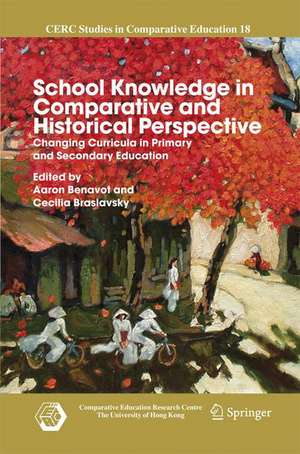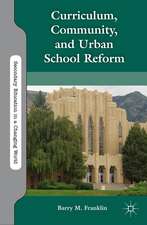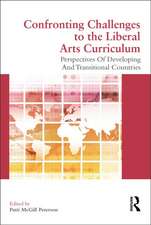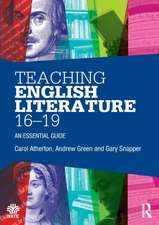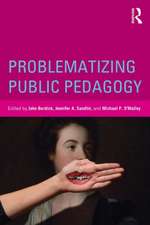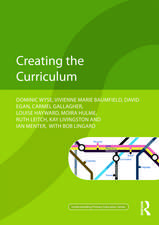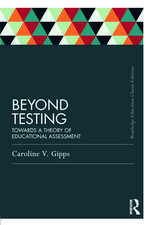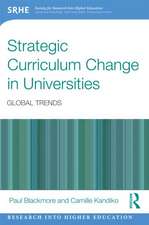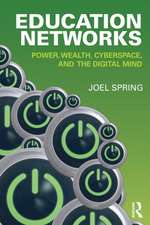School Knowledge in Comparative and Historical Perspective: Changing Curricula in Primary and Secondary Education: CERC Studies in Comparative Education, cartea 18
Editat de Aaron Benavot Nhung Truong Editat de Cecilia Braslavskyen Limba Engleză Hardback – 28 iun 2007
In this special edited volume, scholars with diverse backgrounds and conceptual frameworks explore how economic, political, social and ideological forces impact on school curricula over time and place. In providing regional and global perspectives on curricular policies, practices and reforms, the authors move beyond the conventional notion that school contents reflect principally national priorities and subject-based interests. Some authors emphasize a convergence to standardized global curricular structures and discourses. Others suggest that changes regarding the intended contents of primary and secondary school curricula reveal regional or trans-cultural influences. Overall, these comparative and historical studies demonstrate that the dynamics of curriculum-making and curricular reform are increasingly forged within wider regional, cross-regional and global contexts.
Din seria CERC Studies in Comparative Education
- 18%
 Preț: 1246.72 lei
Preț: 1246.72 lei - 15%
 Preț: 645.60 lei
Preț: 645.60 lei - 18%
 Preț: 952.26 lei
Preț: 952.26 lei - 18%
 Preț: 1328.05 lei
Preț: 1328.05 lei - 15%
 Preț: 643.99 lei
Preț: 643.99 lei - 18%
 Preț: 956.50 lei
Preț: 956.50 lei - 18%
 Preț: 953.82 lei
Preț: 953.82 lei - 18%
 Preț: 955.70 lei
Preț: 955.70 lei - 15%
 Preț: 646.11 lei
Preț: 646.11 lei - 18%
 Preț: 952.40 lei
Preț: 952.40 lei - 18%
 Preț: 1401.30 lei
Preț: 1401.30 lei - 18%
 Preț: 954.62 lei
Preț: 954.62 lei - 18%
 Preț: 953.82 lei
Preț: 953.82 lei - 20%
 Preț: 585.60 lei
Preț: 585.60 lei - 24%
 Preț: 1162.20 lei
Preț: 1162.20 lei - 18%
 Preț: 1222.01 lei
Preț: 1222.01 lei - 24%
 Preț: 812.86 lei
Preț: 812.86 lei - 15%
 Preț: 644.18 lei
Preț: 644.18 lei - 15%
 Preț: 647.27 lei
Preț: 647.27 lei - 15%
 Preț: 648.74 lei
Preț: 648.74 lei - 15%
 Preț: 645.47 lei
Preț: 645.47 lei - 18%
 Preț: 900.94 lei
Preț: 900.94 lei - 18%
 Preț: 952.72 lei
Preț: 952.72 lei
Preț: 952.40 lei
Preț vechi: 1161.47 lei
-18% Nou
Puncte Express: 1429
Preț estimativ în valută:
182.24€ • 189.90$ • 150.90£
182.24€ • 189.90$ • 150.90£
Carte tipărită la comandă
Livrare economică 03-17 aprilie
Preluare comenzi: 021 569.72.76
Specificații
ISBN-13: 9781402057359
ISBN-10: 1402057350
Pagini: 336
Ilustrații: XVIII, 306 p.
Dimensiuni: 155 x 235 x 29 mm
Greutate: 0.64 kg
Ediția:2007
Editura: SPRINGER NETHERLANDS
Colecția Springer
Seria CERC Studies in Comparative Education
Locul publicării:Dordrecht, Netherlands
ISBN-10: 1402057350
Pagini: 336
Ilustrații: XVIII, 306 p.
Dimensiuni: 155 x 235 x 29 mm
Greutate: 0.64 kg
Ediția:2007
Editura: SPRINGER NETHERLANDS
Colecția Springer
Seria CERC Studies in Comparative Education
Locul publicării:Dordrecht, Netherlands
Public țintă
ResearchCuprins
The Changing Ideological Bases of the School Curriculum.- Educational Ideology and the School Curriculum.- The Worldwide Rise of Human Rights Education.- Curricular Contents and Practices in Primary and Secondary Education.- The Spread of English Language Instruction in the Primary School.- Educating Future Citizens in Europe and Asia.- Historical Competence as a Key to Promote Democracy.- The Marginalization of Aesthetic Education in the School Curriculum.- Transmission of Values in Muslim Countries: Religious Education and Moral Development in School Curricula.- World Models of Secondary Education, 1960-2000.- Micro-politics and the Examination of Curricular Practices: The Case of School Notebooks.- The Dynamics of Curriculum-Making and Curricular Reform.- The Current Discourse on Curriculum Change: A Comparative Analysis of National Reports on Education.- The Dynamics of Curriculum Design and Development: Scenarios for Curriculum Evolution.- Socio-historical Processes of Curriculum Change.- New Proposals for Upper Secondary Curricula in Four Latin American Countries, 1990-2005.- School Curricula in Perspective: Reflections on the Past, and Directions for the Future.- Cecilia Braslavsky and the Curriculum: Reflections on a Lifelong Journey in Search of Quality Education for All.- World Models, National Curricula, and the Centrality of the Individual.
Textul de pe ultima copertă
School curricula are established not only to prepare young people for a real world, but also to beckon an imagined one anchored in individual rights and collective progress. Both worlds—the real and the imagined—increasingly reflect influential trans-national forces.
In this special edited volume, scholars with diverse backgrounds and conceptual frameworks explore how economic, political, social and ideological forces impact on school curricula over time and place. In providing regional and global perspectives on curricular policies, practices and reforms, the authors move beyond the conventional notion that school contents reflect principally national priorities and subject-based interests. Some authors emphasize a convergence to standardized global curricular structures and discourses. Others suggest that changes regarding the intended contents of primary and secondary school curricula reveal regional or trans-cultural influences. Overall, these comparative and historical studies demonstrate that the dynamics of curriculum-making and curricular reform are increasingly forged within wider regional, cross-regional and global contexts.
In this special edited volume, scholars with diverse backgrounds and conceptual frameworks explore how economic, political, social and ideological forces impact on school curricula over time and place. In providing regional and global perspectives on curricular policies, practices and reforms, the authors move beyond the conventional notion that school contents reflect principally national priorities and subject-based interests. Some authors emphasize a convergence to standardized global curricular structures and discourses. Others suggest that changes regarding the intended contents of primary and secondary school curricula reveal regional or trans-cultural influences. Overall, these comparative and historical studies demonstrate that the dynamics of curriculum-making and curricular reform are increasingly forged within wider regional, cross-regional and global contexts.
Caracteristici
Addresses important topics often disregarded in comparative studies of education: educational contents, curriculum, and school-based knowledge Brings together leading scholars in the field Includes global, regional and historical perspectives
